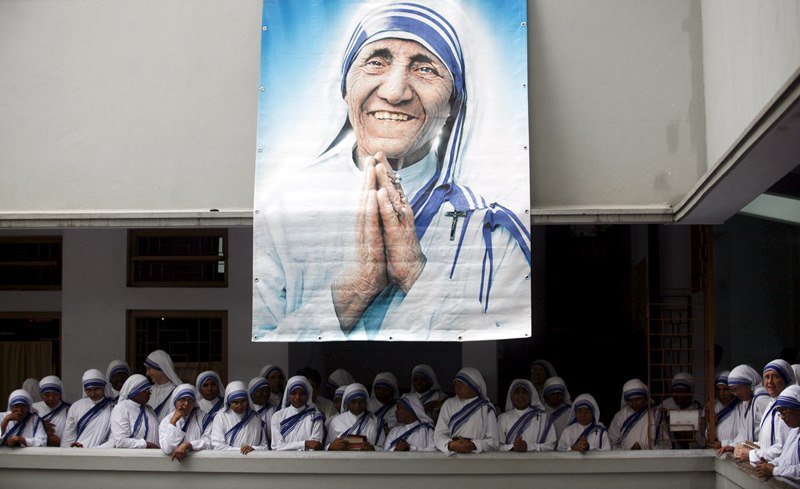
Pope Francis declared Mother Teresa a saint on Sunday, honoring the tiny nun who cared for the world’s most destitute and holding her up as a model for a Catholic Church that goes to the peripheries to find poor, wounded souls.
It’s now official. Mother Teresa’s a saint. This means she represents the epitome of virtue. Nobody dares question this fact, right?
Popes are not usually politically correct. Pope Francis is, because he promotes socialism, anti-capitalism, selfless anti-individualism and he expresses humility in the face of Islam.
It’s not just that Mother Teresa was generous. Lots of people are generous, but they won’t be declared saints. What makes someone a saint, by the prevailing moral standard of our time? Self-sacrifice. Mother Teresa is not hailed for what she did; she’s revered for the fact she gave everything up. It’s the fact that Mother Teresa gave up everything, and chose to wallow in poverty, that qualifies her for sainthood in a moral system where self-sacrifice is the ideal.
Now think about it for a moment. If something’s the ideal, then the world would be a far better place if everyone practiced that ideal, correct? Yet what would happen if everyone lived like Mother Teresa? All of civilization as we know it would stop. There would be no more doctors; no lawyers; no hedge fund managers taking risks in investment; no engineers building bridges; no Silicon Valley executives making all of our software work; no profit-making drug companies manufacturing life-saving medicines; no profit-making food companies filling our stomachs, etc. No Netflix; no Amazon; no iPods; no Nike; no McDonalds; not anything. Why? Because everyone from the CEO to the janitor at these enterprises is doing what he or she does for his or her own sake. None of them are Mother Teresa. The world as we know it would not last for five minutes if all or most of us sacrificed ourselves and lived solely for the sake of others.
The same goes for all the middle managers, clerical workers and laborers who help hold things up, our vast middle class. They would all give up their salaries, their benefits, their vacations, their special treats of favorite clothing, movies, sports events, entertainment, theme parks, on and on. Ditto for the laboring class or working poor, all of whom are trying to survive and advance their interests. All of these things are selfish indulgences. And selfishness is not the ideal, right? Mother Teresa is the ideal, we are told. We worship her for giving up the things none of us ever would. Or at least we pretend to admire her, even though nearly everything we do in our lives points in the opposite direction.
Civilization would literally come to a stop if people stopped pursuing their own interests. Famine and poverty would immediately overtake not just the United States and the Western world, but all of humanity. Billions would die, and they’d die quickly. This is morality? Granted, there would be a lot of needy people desperately crying out for the efforts of a Mother Teresa. But even Mother Teresa, or her contemporary equivalents, would all be famished and diseased themselves, since all of civilization had stopped working. How would she and her Pope fly in their airplanes, and cure their own illnesses, so they could regain their strength to aid the needy? Where would they get the money to fund their projects? In a collapsed economy, there would be no donations.
Bottom line: You can’t call something an ideal or a moral virtue unless you’re prepared for everyone to practice it. Yes, I know it’s unlikely. And thank goodness most of us will never be Mother Teresa! But you have no business saying, “This is the way it should be,” unless (1) you’re prepared to live that way yourself and, (2) you’re prepared to embrace the consequences if everyone else were to do the same.
It’s easy to promote something in theory. But to walk the talk, you must be prepared for everyone to live up to that theory in practice. And if you’re not, then either you are a hypocrite, or your moral theory is flawed, in the first place.
If everyone were Mother Teresa, we’d all inhabit a material and spiritual wasteland far worse than anything she faced while walking the streets of Calcutta all those years. And while she may have alleviated the suffering of a few, for a time, remember that she did nothing to lift that civilization out of poverty in any permanent, meaningful way. Only self-interested, profit-seeking, materialistic economic progress – the capitalism Pope Francis hates so much – can ever do that.
Mother Teresa didn’t produce much of anything. She just allows some of us to feel better about ourselves for applauding her. If we’re honest about it, her works spread guilt, not inspiration. Life is about more than the reduction of suffering and pain. It’s about growth, achievement and soaring to ever-new heights. That’s not Mother Teresa’s world. Yet it’s the world she and others like her count on to do what they do.
My idea of a saint? Someone who produces. Producers don’t do what they do for our sake; they do it for themselves, for their own profit, and out of their own desire to be productive. And that’s just fine with me.
The world desperately needs more producers. Charity is perfectly fine. But don’t kid yourself that charity lifts millions out of poverty and disease. Only economic progress does that. And progress arises not from a Mother Teresa-like compulsion to sacrifice. It arises from the best within us: Our desire to live for our own sakes, most of all.
Follow Dr. Hurd on Facebook. Search under “Michael Hurd” (Rehoboth Beach DE). Get up-to-the-minute postings, recommended articles and links, and engage in back-and-forth discussion with Dr. Hurd on topics of interest. Also follow Dr. Hurd on Twitter at @MichaelJHurd1
